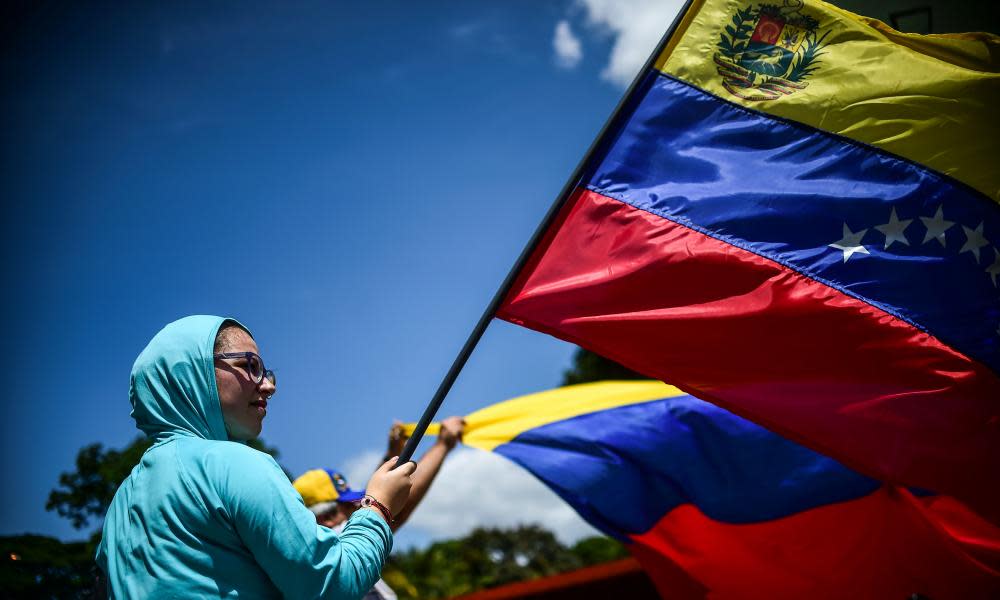In Venezuela, Maduro’s opponents must not lose faith in elections | Reynaldo Trombetta

Venezuelans have all the reasons in the world to be furious and to lose faith in democracy. Those that voted for Hugo Chávez 19 years ago were betrayed by a president that promised to end poverty and corruption. His government proved to be authoritarian and, at best, inefficient, while his successor, Nicolás Maduro, turned out to be a dictator who might one day stand trial for human rights violations.
Those that quickly saw the “revolution” for the corrupt farce it was were oppressed and marginalised. After two decades of abuse it is understandable that they don’t believe in the government’s call to dialogue, don’t feel represented by the leaders of the opposition and don’t support elections.
And those that have kept away from the “chavista” and “anti-chavista” labels live in a country decimated by suicidal economic policies, corruption and mismanagement. It is hard for them to believe in civility or democracy while their nation slides into the abyss. However, dialogue and votes are still the country’s only hope, and Venezuelans cannot afford to be blinded by anger and desperation.
This weekend, as he took part in local polls, Maduro threatened the political parties which had not participated in that vote, saying they would not be allowed to take part in the 2018 presidential election. Incredibly, the threat didn’t spark much indignation. For most Venezuelans, the opposition parties, the next election and the dialogue that is seeking to secure the vote mean nothing.
A recent survey found that 78% of people in the opposition and 62% of independents reject a dialogue with the government. They disapprove of Maduro and his illegitimate constituent assembly, but they also reject the opposition coalition, which they accuse of taking part in a sham dialogue. And they refuse to vote in elections that are clearly rigged.
So what options do Venezuelans have? Hardcore opposition leaders, such as María Corina Machado and Leopoldo López, speak of regime change but haven’t really explained how to go about it. They suggest that if enough people protest on the streets, the government will eventually fall. That didn’t happen earlier this year, when more than 130 people died over three months – are they waiting for even more deaths?
The problem is that Venezuelan forces have proven that they are willing to open fire on protesters and no one in the military or the government will have a crisis of conscience and resign. There will just be more deaths, more international condemnation and fewer opposition voters in the next election.
Human rights abuses by Maduro’s armed forces led to economic sanctions against Venezuela by the US, and threats by the EU. This, combined with the mismanagement of the state oil industry, has weakened the regime – but not enough. The country sits on the world’s biggest crude reserves, and governments with a poor record on human rights, like China, Russia and Iran, are still willing to do business with Venezuela.
In private, some Venezuelans hope a solution could be achieved via a military coup or a US invasion. Those ideas are irrational. Most studies about transitions away from authoritarian regimes show that violent movements very seldom lead to democracy. The Venezuelan military are involved in corruption and human rights violations and the American forces have already shown, in Afghanistan and Iraq, that they are better at generating death and destruction than encouraging a return to democracy.
What the international community can do is put pressure on the government – and the opposition – to engage in an honest dialogue that will lead to free and monitored presidential elections in 2018. The opposition can’t afford to get sidetracked by other demands: true democracy and freedom will only be possible after the elections lead to a regime change.
They also need to overcome any disgust for the idea of a dialogue with the chavistas (it is not uncommon, in the midst of a conflict, to have to negotiate with murderers and tyrants). But most importantly, they need to organise a system that will prevent Maduro from stealing the next election.
In 2007, while working as a reporter in Venezuela, I covered the constitutional referendum. It was the only election Chávez ever lost. The opposition achieved it by ensuring the involvement of international observers, and by establishing a system of audits and a network of witnesses in voting centres and in the electoral council’s “totalisation” room. The president was furious, but he had to accept defeat.
It is a myth that elections do not unseat authoritarian systems. We saw that happen in Brazil in 1985, Chile in 1988 and Mexico in 1997. It can happen in Venezuela too, if the opposition does not give up on the power of the vote.
• Reynaldo Trombetta is a Venezuelan journalist

 Yahoo News
Yahoo News 
